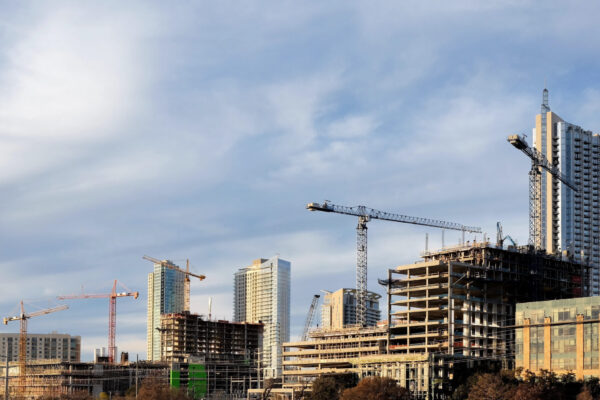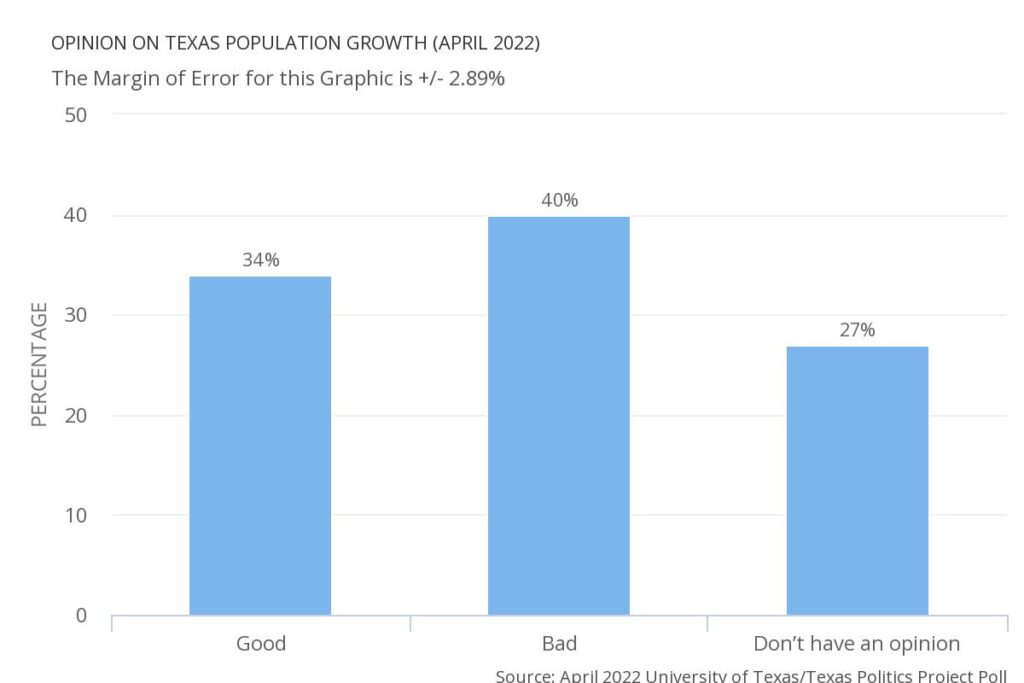AUSTIN, Texas — After two decades of explosive population growth in Texas and amid growing economic disruptions, a majority of Texans said the state is headed in the wrong direction, with more viewing the state’s dramatic population growth as bad for Texas, according to a new University of Texas at Austin/Texas Politics Project Poll.
The survey found that a majority of Texas voters now view the state’s sustained population growth either negatively or with uncertainty. By a wide margin, Texans reported being aware of the state’s recent population growth. However, only 34% viewed that growth as good for the state, while 40% said that it has been bad for the state, with the remaining voters unable to offer an opinion, positive or negative.
Skepticism about the effects of the state’s population growth form part of a larger set of gloomy assessments. National economic problems are reaching Texas: 43% of voters say that their family’s economic situation is worse compared with last year. Among the nearly 9 in 10 Texans who have noticed rising prices, 55% say that those price increases have had a major impact on their current household finances. All these factors converge in the finding that 51% of Texans say the state is on the wrong track, and 66% say that the country is headed in the same, wrong direction.
“Despite the frequent boosterism among state leaders about people and businesses moving to Texas, there are signs that many Texans now perceive downsides to that growth,” said James Henson, executive director of UT Austin’s Texas Politics Project and a founding co-director of the polling project. “This is the first time that we’ve seen negative views outweighing positive evaluations of the impact of growth on the state.”
The poll was conducted April 14-22 among 1,200 registered voters in Texas and has a margin of error of +/- 2.83 percentage points for the full sample.
The poll also checked in on the state of the race for Texas governor, where incumbent Gov. Greg Abbott is being challenged by former Democratic U.S. Rep. Beto O’Rourke. Abbott led O’Rourke 48% to 37% among the poll’s sample of registered voters, with 16% uncommitted.
“Support for both Abbott and O’Rourke has remained consistent among key groups of voters in the electorate, looking back over the last three UT surveys,” said Joshua Blank, research director of the Texas Politics Project. “If O’Rourke is going to tighten the race with Abbott over the next seven months, he’s going to have to improve his standing among independents, Hispanics and suburban voters relative to the governor.”
Border security and immigration issues continue to loom large over the public opinion landscape. Texans view immigration and border security as the state’s top priority (20% border security; 14% immigration), driven primarily by the views of Republican voters, among whom 37% choose border security and 24% immigration as the most important problems facing the state — compared with only 4% of Democrats.
“Since the advent of this survey in 2007, Texans have consistently cited immigration and border security as a top concern,” said Daron Shaw, co-founder of the UT poll and a professor of government. “But Lone Star voters are split on what to do. They want to secure the border, but they also want something done about the undocumented people who are here. Above all, Texans are practical; they want solutions, not soundbites.”
As the state spends approximately $4 billion on border security in the current biennium, the survey finds Texans split on the state’s increasing expenditures. The plurality, 32%, said the state spends too little on border security, driven again by the views of Republican voters. Fifty-one percent of Republicans said the state is still spending too little, 30% say the state spends too much, and 20% say the state is spending the right amount on border security.
“Despite the significant increase in state resources, both human and financial, to address the situation at the Texas-Mexico border, there’s little indication that voters’ preferences for border security spending are budging,” Blank said. “Democrats view the increased expenditures with skepticism, and the state’s Republican voters continue to ask for more.”
The poll also included extensive questioning about a range of policy subjects, including COVID-19, public safety, K-12 education and abortion. When asked, “Do you support or oppose automatically banning all abortions in Texas if the U.S. Supreme Court overturns Roe v. Wade?” a majority of Texas voters, 56%, continue to oppose or strongly oppose such a ban (12% and 42%, respectively), while 35% expressed support.
Full results from the poll are available on the Texas Politics Project Latest Poll page.





